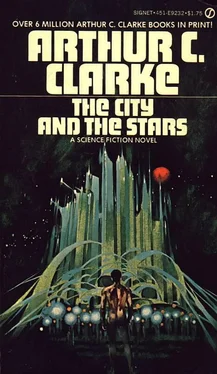«I have some news for you, Alvin,» he said. «I think you know Senator Gerane.»
Alvin was puzzled for a moment; then he remembered.
«Of course-he was one of the first men I met in Lys. Isn’t he a member of their delegation?»
«Yes, we have grown to know each other quite well. He is a brilliant man, and understands more about the human mind than I would have believed possible-though he tells me that by the standards of Lys he is only a beginner. While he is here, he is starting a project which will be very close to your heart. He is hoping to analyze the compulsion which keeps us in the city, and he believes that once he has discovered how it was imposed, he will be able to remove it. About twenty of us are already co-operating with him.»
«And you are one of them?»
«Yes,» replied Jeserac, showing the nearest approach to bashfulness that Alvin had ever seen or ever would see. «It is not easy, and certainly not pleasant-but it is stimulating.»
«How does Gerane work?»
«He is operating through the sagas. He has had a whole series of them constructed, and studies our reactions when we are experiencing them. I never thought, at my age, that I should go back to my childhood recreations again»
«What are the sagas?» asked Hilvar.
«Imaginary dream worlds,» exclaimed Alvin. «At least, most of them are imaginary, though some are probably based on historical facts. There are millions of them recorded in the memory cells of the city; you can take your choice of any kind of adventure or experience you wish, and it will seem utterly real to you while the impulses are being fed into your mind.» He turned to Jeserac.
«What kind of sagas does Gerane take you into?»
«Most of them are concerned, as you might expect, with leaving Diaspar. Some have taken us back to our very earliest lives, to as near to the founding of the city as we can get. Gerane believes that the closer he can get to the origin of this compulsion, the more easily he will be able to undermine it.»
Alvin felt very encouraged by this news. His work would be merely half accomplished if he had opened the gates of Diaspar-only to find that no one would pass through them.
«Do you really want to be able to leave Diaspar?» asked Hilvar shrewdly.
«No,» replied Jeserac, without hesitation. «I am terrified of the idea. But I realize that we were completely wrong in thinking that Diaspar was all the world that mattered, and logic tells me that something has to be done to rectify the mistake. Emotionally, I am still quite incapable of leaving the city; perhaps I always shall be. Gerane thinks he can get some of us to come to Lys, and I am willing to help him with the experiment-even though half– the time I hope that it will fail.»
Alvin looked at his old tutor with a new respect. He no longer discounted the power of suggestion, nor underestimated the forces which could compel a man to act in defiance of logic. He could not help comparing Jeserac’s calm courage with Khedron’s panic flight into the future,-though with his new understanding of human nature he no longer cared to condemn the Jester for what he had done.
Gerane, he was certain, would accomplish what he had set out to do. Jeserac might be too old to break the pattern of a lifetime, however willing he might be to start afresh.
That did not matter, for others would succeed, with their skilled guidance of the psychologists of Lys. And once a few» had escaped from their billion-year-old mold, it would only be a question of time before the remainder could follow.
He wondered what would happen to Diaspar and to Lys when the barriers were fully down. Somehow, the best elements of both must be saved, and welded into a new and healthier culture. It was a terrifying task, and would need all the wisdom and all the patience that each could bring to bear.
Some of the difficulties of the forthcoming adjustments: had already been encountered. The visitors from Lys had, politely enough, refused to live in the homes provided for them in the city. They had set up their own temporary accommodation in the park, among surroundings, which reminded them of Lys. Hilvar was the only exception; though he disliked living in a house with indeterminate walls and ephemeral furniture, he bravely accepted Alvin’s hospitality, reassured by the promise that they would not stay here for long.
Hilvar had never felt lonely in his life, but he knew loneliness in Diaspar. The city was stranger to him than Lys had, been to Alvin, and he was oppressed and overwhelmed by its infinite complexity and by the myriads of strangers who seemed to crowd every inch of space around him. He knew, if only in a tenuous manner, everyone in Lys, whether he had met them or not. In a thousand lifetimes he could never know everyone in Diaspar, and though he realized that this was and irrational feeling, it left him vaguely depressed. Only his loyalty to Alvin held him here in a world that had nothing in common with his own.
He had often tried to analyze his feelings toward Alviti. His friendship sprang, he knew, from the same source th inspired his sympathy for all small and struggling creatur This would have astonished those who thought of Alvin as willful, stubborn, and self-centered, needing no affection from anyone and incapable of returning it even if it was offered.
Hilvar knew better than this; he had sensed it instinctive even from the first. Alvin was an explorer, and all explor are seeking something they have lost. It is seldom that they find it, and more seldom still that the attainment brings them greater happiness than the quest.
What Alvin was seeking, Hilvar did not know. He was driven by forces that had been set in motion ages before, by the men of genius who planned Diaspar with such perverse skill or by the men of even greater genius who had opposed them. Like every human being, Alvin was in some measure a machine, his actions predetermined by his inheritance. That did not alter his need for understanding and sympathy, nor did it render him immune to loneliness or frustration. To his own people he was so unaccountable a creature that they sometimes forgot that he still shared their emotions. It needed a stranger from a totally different environment to see him as another human being.
Within a few days of arriving in Diaspar, Hilvar had met more people than in his entire life. Met them-and had grown to know practically none. Because they were so crowded together, the inhabitants of the city maintained a reserve that was hard to penetrate. The only privacy they knew was that of the mind and they still clung to this even as they made their way through the endless social activities of Diaspar. Hilvar felt sorry for them though he knew that they felt no need for his sympathy. They did not realize what they were missing-they could not understand the warm sense of community, the feeling of belonging which linked everyone together in the telepathic society of Lys. Indeed, though they were polite enough to try to conceal it, it was obvious that most of the people he spoke to looked upon him pityingly as leading an incredibly dull and drab existence.
Eriston and Etania, Alvin’s guardians, Hilvar quickly dismissed as kindly but totally baffled nonentities. He found it very confusing to hear Alvin refer to them as his father and mother-words which in Lys still retained their ancient biological meaning. It required a continual effort of imagination to remember that the laws of life and death had been repealed by the makers of Diaspar, and there were times when it seemed to Hilvar that despite all the activity around him, the city was half empty because it had no children.
He wondered what would happen to Diaspar now that its long isolation was over. The best thing the city could do, he decided, was to destroy the Memory Banks which had held it entranced for so many ages. Miraculous though they were-perhaps the supreme triumph of the science that had produced them-they were the creations of a sick culture, a culture that had been afraid of many things. Some of those fears had been based on reality, but others, it now seemed, lay only in the imagination. Hilvar knew a little of the pattern that was beginning to emerge from the exploration of Vanamonde’s mind. In a few days, Diaspar would know it too-and would discover how much of its past had been a myth.
Читать дальше












